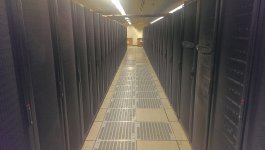Computing Facilities
Computing facilities and support are provided by the College of Science (Science IT), and the central university computing group, known as Purdue IT. It centrally supports many computing resources, including instructional labs, classroom technologies, core network infrastructure, research computing, etc. The Department, the Science IT group, and Purdue IT work closely together to provide a robust computing environment that facilitates world-class instruction and research.
IT Staff
The Department of Statistics is part of the College of Science, which has a multi-member centralized IT organization to serve the College and Departmental computational needs.
Departmental Facilities
The Department of Statistics, with the assistance of the College of Science, maintains Linux servers and workstations (physical and virtualized) for research and administration. The Linux servers run the Ubuntu operating system. The departmental research servers range in power, but all have between eight and 28 CPU cores. This includes two servers with 1TB RAM, one with 768GB RAM, three with 512GB RAM, one with 384GB RAM, three with 256GB RAM, and others with various smaller memory configurations. These servers have various storage configurations ranging from 168TB on the largest server, to 12TB SSD on the fastest server, to as little as 1TB on the smallest.
University Facilities

The central Purdue University IT organization, Purdue IT, provides a wide array of computing resources to researchers. Resources include several supercomputers, each with 1-3PB of dedicated scratch storage, more than 15 petabytes of automated tape storage, and a 3 petabyte on-demand storage facility. Campus buildings have at least 20 Gbps connectivity to other campus buildings. There is a 200 Gbps link to the national research network infrastructure. Every year or so the oldest supercomputer is retired and a new one is built to replace it. The new supercomputers often debut in the top500.org list of the fastest supercomputers in the world.
Purdue IT’s Rosen Center for Advanced Computing (RCAC) provides a number of research computing solutions. The Community Cluster Program pools funds from grants, faculty startup packages, and institutional sources to fund supercomputers and make more computing power available than faculty could afford individually. The Rosen Center installs, administers, and maintains those systems so researchers can concentrate on doing research without having to manage a high-performance computing system themselves.
For more information, go to the Rosen Center for Advanced Computing website to learn about the services they offer. RCAC together with the resources administered by Science IT specialized solutions for research computing needs can be provided to you.